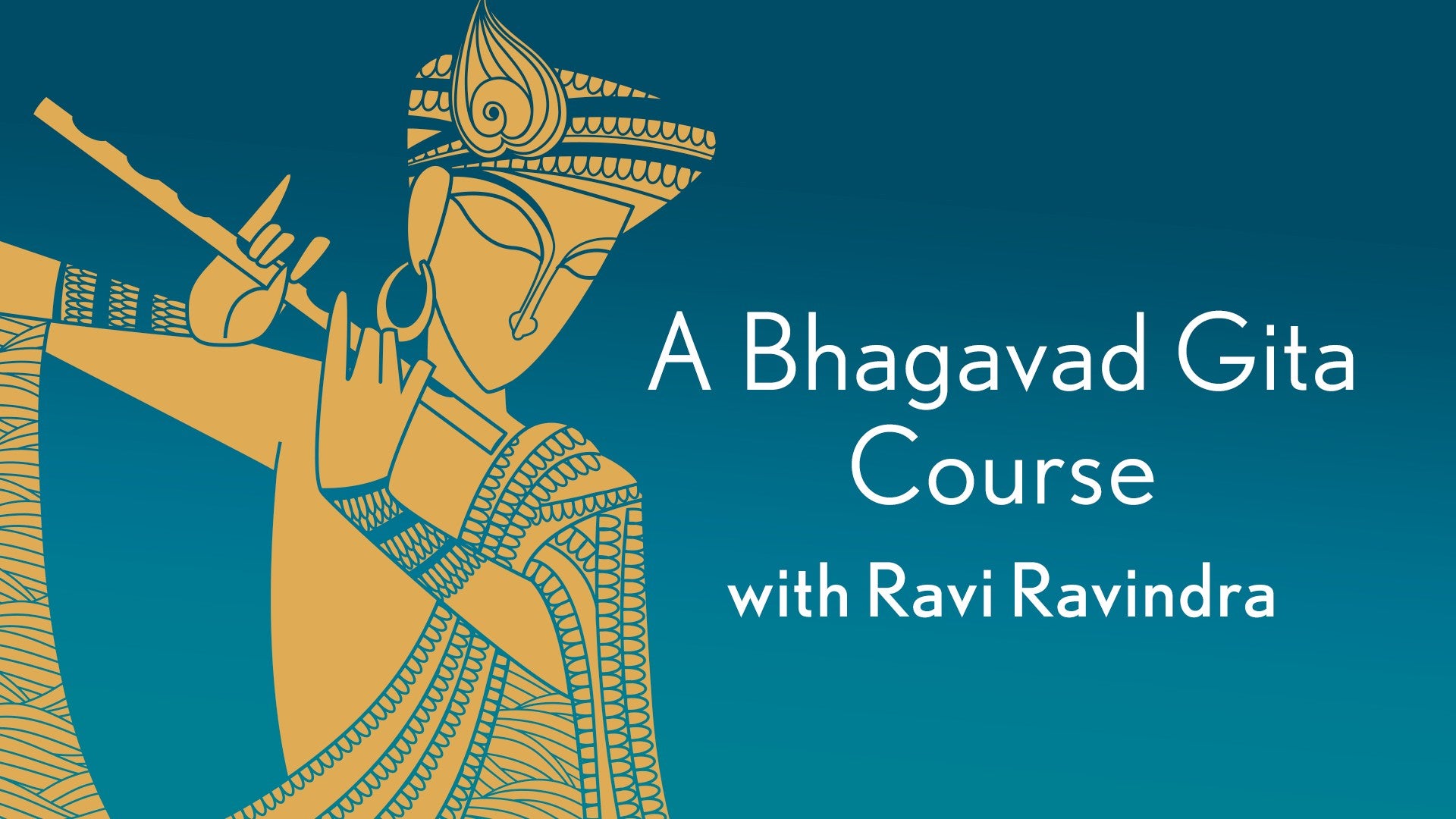Description
About This Video
Transcript
Read Full Transcript
Ká¹?á¹£á¹?a teaches yoga so that Arjuna can come to the level of Ká¹?á¹£á¹?a Himself. That is the ideal. On the other hand, because He also has to be involved in the world, so He actually becomes an intermediary between the highest level, namely Ká¹?á¹£á¹?a, and a warrior in the battlefield. So the whole teaching is how to be the intermediary between the highest level and our usual worldly level. Literally the word Bhagavad means the blessed one, and Gita means song. The whole thing is actually a large poem, if you like. And in fact, in general, in India, it will be sung in a meter. And so Bhagavad-gÄ«tÄ쳌 literally means the song of the blessed one. However, commonly, because of the respect for Ká¹?á¹£á¹?a, who is obviously the main speaker in the Bhagavad-gÄ«tÄ쳌, He is the teacher, so it is often translated as the song of the blessed Lord. But the word Lord is actually not in the text itself. It's the song of the blessed one. So Ká¹?á¹£á¹?a is the blessed one. Generally, I actually recommend that, of course, it's written in Sanskrit, and most of us don't know Sanskrit, so any translation will do. But my advice is to learn about twelve or so Sanskrit words, because it is extremely difficult to have one English word translation for a serious word in Sanskrit. And then it allows us to feel a little bit of the richness of the text. So any translation will do, to start with. But if you begin to then become aware, which are the major words that are being translated, it gives you certain freedom, particularly if you read more than one translation. It gives you a certain freedom in between. So I would suggest to take one or two words in between, and I would suggest to take one or two translations that either appeal to you or your friends recommend to you, and then see if you can, which part of the Bhagavad Gita especially touches you, then to take it more seriously, to study it, to wonder if it is true for me. Yes, I know sometimes I actually almost say this as a joke, that any serious conversation can take place only among consenting adults. The reason for that is, if I just wish to argue about something, or to prove my point, this is what the Bhagavad Gita says, and everything else is just wrong in understanding, then any exchange or conversation doesn't actually help and large our understanding. If people are generally in agreement that a scripture, in this case the Bhagavad Gita, it could be the Gospels or remarks of the Buddha, but that it is actually worth studying, worth trying to understand what the great teachers are teaching or trying to say something, then my understanding can be actually different from your understanding.
Then that can actually help both of us to come to a slightly subtler or a higher understanding, because as I repeatedly keep saying, expression of truth is not the truth, but everybody has to use some expressions. But how I understand an expression may be a little differently from what you understand, then if we are agreeing that it is worth studying, not just worth arguing or proving something right or wrong, then we can actually learn from the differences in our understanding. So in that sense, the Sangha or the community actually assists the understanding of each person. Well, Dharma, although it has many meanings, but essentially it really comes down to what is the right action in any given situation. Essentially Krishna says that really no action can be right until the actor is right. So to become the right actor, human beings need to undertake a very deep-seated transformation of our usual nature, of our usual self. So yoga is really the science of transformation, which is what Krishna then tries to teach. But then he also makes this remark that yoga, strictly speaking, or any serious teaching cannot really be accomplished until I am willing, first of all, to undertake yajja. Now yajja, also pronounced as yagya, literally is translated as sacrifice, which means I am willing to sacrifice being the way I usually am, so that I can actually be transformed. But it also requires, yajja involves intervention from a subtler level, both within myself as well as outside myself. Often we end up calling it, oh, something, I was very lucky, or it was my destiny. This is largely because we don't understand that I am not running the whole universe, there are many forces are there, and there are forces which intervene in what I am trying to do, but there are also forces, we call them devas in India, who wish to help what I am doing. So unless there is a help from a deva deep inside me, or outside me, these forces are everywhere, then yoga cannot, strictly speaking, be accomplished. So these three words are key words to understand. Dharma can be fulfilled by the discipline of yoga, but in order to accomplish yoga, I need yajya. The Bhagavad Gita teaches many kinds of yogas, depending partly on the nature of the person. By yoga I simply repeat again, yoga is a science of transformation. So a person needs to be transformed. What does that mean? That essentially means that a person comes to a level within herself or himself from where they can be aware of what is subtler than themselves, what is that has brought them about in this life, on this planet. Then they can more discipline their whole usual mind and the body to carry out that responsibility. So in a way, how the teaching of the Bhagavad Gita can assist anybody is gradually to become more and more aware of what I am, what stands in my way, and how can I be free of that, what sort of practice is required. And the Bhagavad Gita is really very much emphasizing the whole yoga of awareness, or what I call Sanskrit usage will be buddhi yoga. Because awareness is the mechanism of transformation. Whatever I become aware of changes in its quality and in its relationship with me. As a general, first of all, an overall remark, as far as I am aware, all the sages in the history of humanity and all the great scientists and the great poets have all said naturally in different languages that the entire universe is pervaded by subtle and conscious energies. Naturally the labels vary, whether it's filled with the Holy Spirit or with God or with Allah or with Brahma or just absolute or to use Einstein's remark, it's filled with cosmic intelligence. So naturally the words vary, the expressions vary. Then what is common to all of them is that these are more conscious than I am, these energies, and subtler than my thinking. Therefore I cannot command them, but it is possible for me to become more and more receptive to these forces. Always also remembering that these forces are not only more conscious than I am, but that they are universally present everywhere, including this room. So if we just use, let us say, one expression that the Holy Spirit is right here, right around me, in fact even inside me, but how do I become receptive to this? That is where from our side the major contribution we can make really are essentially relaxation, because even in ordinary science we would say, subtler the energy, more easily it is repelled by tensions. But relaxation, not only physical, emotional relaxation is even more important. In fact really our physical tensions result from emotional tensions. We don't always seem to be aware of this. So emotional relaxation, at least temporarily to be a little free of anxiety, worry, resentment, or even expectation. And I think that has helped very much if I simply remind myself that the universe is extremely large, trillions of galaxies, and the forces occupying it are intelligent, conscious. It's amazing that they have decided to create me for a few decades. That naturally produces a sense of gratitude as well as a sense of wonder. And therefore these two great feelings take up the usual emotional energy that goes into worrying and anxiety, etc. So if I can keep returning to this great miracle, my existence, your existence, everybody's existence is actually a miracle. That just for a few decades I should be here. So if I can come back to this out of a whole sense of wonder, and wonder and anxiety cannot coexist. The other contribution from our side is to always to finally write alignment. I use the word, in Sanskrit we use the word asana. Asana gets translated usually as posture, but it is really the whole, it also includes intellectual posture. So I don't have to make comment on everything I hear or to pigeonhole it, whether it agrees with the Bible or the Bhagavad Gita or what I heard earlier, or what I know, what is surprising. All of this is not, I don't need to put things into categories all the time. If I can be a little free of that, with the clear understanding that however smart I may be, in fact I sometimes say, even if I were a combined intellect of Shankara, Nagarjuna, Aristotle and Einstein, I still cannot know all there is to know. Therefore a little freedom from my knowledge. I know something, nobody is suggesting ignorance. I know something, but what I do not know is enormously more than what I know. Therefore a certain willingness to be surprised. These are the two really major contributions from our side that we can make. Then whatever forces or energies have brought me here, they can hardly be against me. They wish to assist me to do what is the reason for my existence. Because here Arjuna himself, of course first of all he won't be able to see anything of the great form of Krishna until he has been considerably transformed. So now we are here talking about eleventh chapter in the Bhagavad Gita. Total number of chapters is eighteen. So a great deal of transformation has taken place. But still what he does say that although my heart is glad but my mind is afraid, because our ordinary mind is whatever it understands, it wishes to control it. In fact, I was mentioning this to some friends the other day. Pamela Travers, the author of Mary Poppins, whom I actually have had many conversations with her, she actually at one stage makes this special remark that what we call understanding is actually usually overstanding. We are not standing under something. We wish to control it. And then we almost institutionalize this in the sciences. We say we understand something rigorously, scientifically, if we can control it and predict it. Now what does that mean? If something is subtler or higher than myself, I can hardly control it. Therefore I cannot understand or know it in the usual sense of knowing and understanding. Which is why the suggestion that it is not so much a matter of my grabbing it or grasping it, it is more a matter of becoming receptive to it. And that requires, of course, a very serious attention from my side. On the other hand, always a suggestion that it is also a matter of a benediction from the other side. Sometimes we use words like grace or we say good luck, etc. But the idea nevertheless is I do my part, but I am not running the whole universe. Things are coming from the other side.
If we become more and more sensitive to our own organism, we will actually see. First of all, there is a constant movement of energy that is going on in the organism connecting our various energy centers. Thinking, feeling, moving. And the quality of that energy actually changes if one is related with something subtler or aware of something subtler. The way we can more easily perhaps recognize this, that it changes the quality of our breathing and also the feeling that attends it. There is more and more a sense of relaxation and less and less anxiety and more a sense of really wonder that it is amazing that I am alive. And one can actually physically experience this. My own hope really studying any of these scriptural texts, not only what gets called scripture but teachings of any of the great sages, say what Raman Maharishi said or what Krishnamurti or anybody who appeals to you in some way, my hope is that try to understand more and more deeply what they are actually saying but much more importantly to ask how does it apply to me? How can I in fact not merely take the words but practice? What is the corresponding practice? Because this is then it is also true, it is a bit of a paradox. If Krishna or the Buddha or Christ is describing something which they experience, obviously I am not at that level. I can't quite experience this but still something in my heart is actually touched by what they teach. We often don't realize that subtler feelings are actually an avenue to truth, in fact much more than the ordinary mind which is why all serious teachings, for example the Yoga Sutras, invite us to quieten the ordinary mind and slightly subtler feelings which of course we can practice refining them a little bit, not to be just taken by me, me, me or self-important, then one can sometimes hear whispers behind the words that these great teachers are actually using. Lovely remark of a great scientist Pascal, heart has reasons that reason does not know. In fact many of the very great discoveries in science or anywhere else are actually made more by feeling or by we call it intuition often, that's another way of putting the same thing.
But if I ask myself how does it apply to me and then it may be that much of what is being said applies to Christ or the Buddha, certainly not quite my experience but I don't need to dismiss it. Maybe in one year, ten years, ten lifetimes I will grow up and would actually be able to experience what the Christ experienced. So it's a bit of a paradox. I need to rely on what I now experience at the same time to allow the possibility that something in me will develop, that I'll be able to experience something that I don't now experience. Sure, maybe one of the shlokas of the Bhagavad Gita which is very often repeated actually in India, yada yada hi dharmasya glanir bhavati bharata abhyuktanam adharamasya tadatamanam sryamaham whenever dharma declines and the opposite of dharma, adharma, ascends then in order to protect the righteous people and in order to overcome the evildoers, I take incarnation again and again.
Bhagavad Gita
Comments
You need to be a subscriber to post a comment.
Please Log In or Create an Account to start your free trial.














